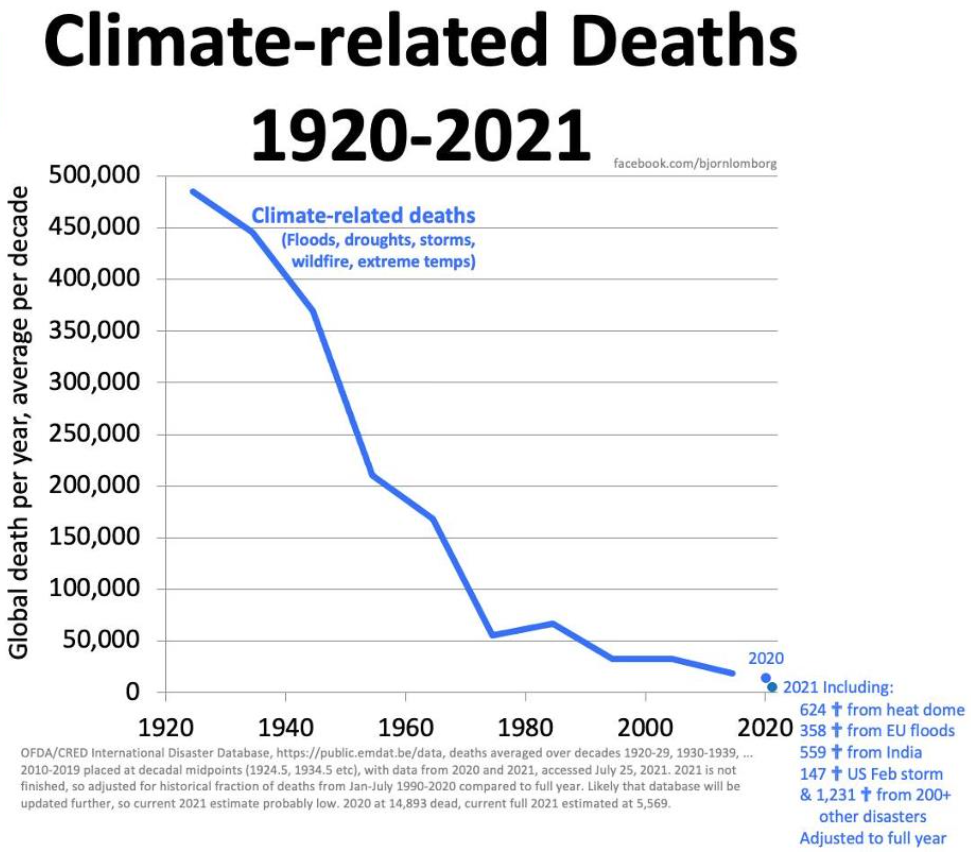After the release of the Intergovernmental Panel on Climate Change’s (IPCC) latest Synthesis Report, multiple media outlets cautioned their peers against leaning too far into the catastrophe narrative, as it might be counterproductive for climate policy and, perhaps, inaccurate too. Their warning is justified because despite decades of climate activists telling people that the Earth is about to end due to climate change, history and data show climate change is neither producing more extreme weather events, nor destroying society or worsening the conditions for human life. In reality, the planet is not showing signs of impending doom due to climate change at all.
Several articles, including in the U.K.’s Daily Mail, The Washington Post, Vox, The Tacoma Ledger, and Harper’s Magazine, have cropped up with the central message that climate change is a threat, but it might not be hopeless, or as severe and immediate as the mainstream media, including often their own publications, have been claiming over the past few decades.
In The Washington Post article “Why climate ‘doomers’ are replacing climate ‘deniers,’” a climate reporter writes that certain segments of the population are becoming “doomers” on climate change, believing that there is no hope for reaching climate targets. WaPo reports “some scientists and experts worry that their defeatism — which could undermine efforts to take action — may be just as dangerous as climate denial.”
Among the articles in an “Against doomerism,” issue of VOX, is one, titled “We need the right kind of climate optimism,” in which the author writes that exaggerating threats and scaring people into supporting your cause doesn’t work, “we need the right kind of optimists: those who recognize that the world will only improve if we fight for it.”
In Harper’s Magazine, an article titled “The Incredible Disappearing Doomsday: How the climate catastrophists learned to stop worrying and love the calm,” similarly insists that “doom-peddling” journalists are not helping the effort to prevent dangerous climate change. The author writes also that the world “has yet to demonstrate the political will to save itself; stories that give readers the misleading impression that things will be just fine are overcorrecting for our prior fatalism, and risk replacing it with complacency.”
The Tacoma Ledger takes a slightly different tack, insisting that “the planet is in the process of becoming uninhabitable, but we still have the time to change that.” In fact, the Ledger says that progress is being made towards reducing emissions and will continue.
The Daily Mail published an article, titled “The hysterical language and scaremongering we hear about climate change is self-defeating,” where Ross Clark debunks some of the most egregious claims of climate alarmists, including several that are often covered by Climate Realism like claims that flooding, drought, and hurricanes, are worsening. Clark’s piece is relatively level headed, pointing out “if you believe that human societies are doomed anyway — as 56 per cent of young people apparently do — what is the incentive to cut emissions?”
What these pieces get right, though not necessarily very clearly, is that fearmongering, exaggerating, and doomsaying about the impacts of recent warming are likely harming the mental health of many people, but especially young people.
Some mainstream media outlets have even blamed climate change for the terrorizing civilians, which Climate Realism debunked in “Wrong, Mainstream Media, Climate Change is Not Causing PTSD.”
With the exception of the Daily Mail piece, all of the articles still mistakenly insist that extreme weather is getting worse, and that billions will suffer and starve if the earth reaches 1.5 degrees Celsius of warming. There is simply no scientific evidence, not even in the IPCC reports, that this is the case.
Data from the International Disaster Database show that human deaths from the impacts of extreme weather have been declining for decades as the earth modestly warms. (See figure below)

The articles warning of the dangers of doomerism, listed above, mark a shift in tone, though, for the most part, not in underlying substance. They make the case that the world is not doomed, because there is still time to stop dangerous climate change. Many of the pieces focus on the idea that, in truth, there is no specific “tipping point” at which time the world will cascade into cataclysm, as Climate Realism has repeatedly debunked here, here, and here, for instance.
Not only is there no tipping point for climate catastrophe, as these stories admit, there is also no evidence climate change is making the world worse for the planet or humanity. The articles are uniformly wrong about the latter point. Since its inception, Climate Realism would have had nothing to report on if journalists’ and politicians’ predictions about the harmful, life and planet destroying impacts of climate change had been coming true. They haven’t, which is the main reason doomerism is unjustified.


















Thank you for writing this powerful article exposing the Tom foolery of climate change alarmism.
Our Earth is over 4 Billion years old, and the climate has been changing during that entire period. Climate doomers have found some really good halucinogenic drugs and apparently take them on a weekly basis. I will check it out so I can get some for myself, because I become morbidly rabid as Thunderstorms approach.
Morbid Mike